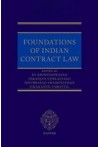- Author(s): K.V. KrishnaPrasad, Niranjan Venkatesan, Shivprasad Swaminathan, Umakanth Varottil
- Publisher: Oxford University Press
- Edition: Ed 2024
- ISBN 13 9780198975052
- Approx. Pages 580 + Contenst
- Format Hardbound
- Approx. Product Size 24 x 18 cms
- Delivery Time 3-5 working days (within Kerala & South India) (Others 7-9 days)
- Shipping Charge Extra (see Shopping Cart)
....................................................................................................................................................................
Description
The Indian Contract Act turned 150 in 2022. On any view, it has stood the test of time. This book has its origins in our perception that, nonetheless, Indian contract law has not received the scholarly attention that it warrants. In this, contract law in India is not alone. It is fair to say that, for many years, Indian legal literature has been dominated by public law rather than private law. Although the fact of this is beyond serious dis- pute, the reasons for it are not. One reason may be that the work of the higher courts in India tends to be dominated by public law. By contrast, for example, to the UK Supreme Court or the Singapore Court of Appeal, which tend to decide at least a few cases each year involving far-reaching and complex questions of private law, the Indian Supreme Court is best known for its public law jurisprudence. Indeed, it is difficult to think of any recent Indian Supreme Court decision in the field of private law (excluding arbi- tration) that has attracted anywhere near as much attention as some of its public law judgments.
This is not to say that Indian private law is unimportant. On the contrary, India is set to be the world's third biggest economy by 2030.1 It is already home to very substantial commercial activity, and inherent in such activity is the need for mechanisms to re- solve substantial commercial disputes. Many of the highest-value commercial disputes in India tend to be exported, most commonly to arbitration in Singapore or London and sometimes to the English courts. In such cases, of which some of us have profes- sional experience, it is often necessary for a foreign court or arbitral tribunal to decide complex and controversial questions of Indian contract law (eg the distinction between a penalty and liquidated damages, the scope of the right to terminate for repudiatory breach, and the assessment of damages). In doing this, the first port of call tends to be standard textbooks on Indian contract law. However, valuable as those textbooks are, they do not always provide the answer, nor do they attempt to examine the foun- dational assumptions on which the Contract Act is based. Indeed, to our knowledge, there is no treatise that does so.
This gap in the literature has had two principal consequences.
The first is that scholarship examining the conceptual foundations of Indian con- tract law is rare, and an examination of the legislative history of particular provisions of the Contract Act is rarer still. As we hope this book demonstrates, such scholar- ship has valuable insights to offer as to the resolution of difficult questions of law that trouble the courts in modern litigation. One example suffices to illustrate the point. In English law, it is well-established that a wrongful termination of a contract may itself be
S Sinha, 'India Set to Become 3rd Largest Economy by 2030, Says S&P Global', The Hindu BusinessLine
(5 December 2023).
...................................................................................................................................................................
Contents
PART I. GENERAL THEMES
1. History and Drafting of the Indian Contract Act 1872
2. Legislative Design and the Codification Project
3. Contractual Interpretation
4. Migration of the Indian Contract Act 1872: The Case of Malaysia
PART II. CORE CONCEPTS
5. Formation
6. Consideration
7. Parties and Assignment
8. Incapacity and Its Consequences
9. Coercion, Undue Influence, and Unconscionability
10. Fraud, Misrepresentation, and Mistake
11. Illegality
12. Restraint of Trade in India: Reason (Un) restrained?PART IV. CONCLUSION
13. Performance, Breach, and Termination
14. Frustration
15. The Duty of Good Faith
16. Damages
17. Stipulated Sums and Limitation Clauses
18. The Action for the Agreed Sum and Specific Performance in Indian Law
19. Rescission of Contracts Voidable for Lack of Free Consent
PART III. SPECIAL CONTRACTS
20. Indemnity and Guarantee
21. Bailment and Pledge
22. Shareholder Agreements in India: An Unsettled Jurisprudence
23. Contracting with the State
24. Concluding Remarks
Hugh Beale
PART IV. CONCLUSION
...................................................................................................................................................................
Author Details
K.V. KrishnaPrasad
Niranjan Venkatesan
Shivprasad Swaminathan
Umakanth Varottil

